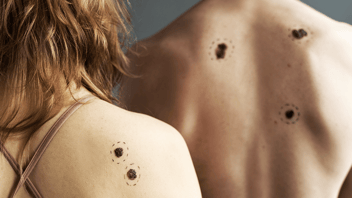
When it comes to light-based skin treatments, Intense Pulsed Light (IPL) and laser therapy often get mixed up, and who can blame you? They both work wonders on similar skin issues like sun damage, pesky brown spots, and broken blood vessels. But don't let the similarities fool you – IPL and laser therapy are quite different. Let's clear up the confusion and help you find the right path to glowing skin!
Understanding Light-Based Skin Treatments
Light-based skin treatments encompass various technologies, with IPL and laser therapy being the most popular. Despite their similarities in treating skin issues, the mechanisms and applications of these treatments differ significantly.
What Is IPL (Intense Pulsed Light)?
IPL is an excellent treatment option for those seeking facial rejuvenation with little to no downtime following treatment. Multiple treatments are often recommended for optimal results. IPL therapy utilizes a series of high-intensity pulses of broad-spectrum light. This light targets the pigment in the skin, making it effective for:
- Sun Damage and Pigmentation: IPL breaks down melanin, reducing the appearance of sunspots, age spots, and freckles.
- Vascular Lesions: It targets hemoglobin to treat broken blood vessels, spider veins, and rosacea.
- Skin Rejuvenation: IPL can improve skin texture and reduce fine lines and wrinkles by stimulating collagen production.
An IPL Is Specifically Handy for:
- Diminishing redness in the face
- Reducing brown spots
- Rejuvenating visibly aging or damaged skin
- Erasing broken capillaries
- Minimizing pore size.
What Is Laser Therapy?
Laser treatments use a concentrated beam of light energy directed at specific targets. This precision allows for focused treatment, making it suitable for:
- Deep Skin Resurfacing: Lasers can penetrate deeper layers of the skin, effectively treating deeper wrinkles, scars, and severe sun damage.
- Precise Targeting: Different lasers (e.g., CO2, Erbium) can be tailored to concerns like acne scars, warts, and tattoo removal.
- Hair Removal: Laser hair removal uses light energy to destroy hair follicles. It is often more effective for darker hair on lighter skin.
Key Differences Between IPL and Laser
IPL and laser treatments are popular for skin rejuvenation and hair removal, but they work differently. Let's break down the differences.
- Light Source: IPL uses a broad spectrum of light wavelengths, which makes it great for treating various skin issues. Laser treatments use a single wavelength of light, targeting specific concerns more effectively, such as hair removal or skin resurfacing.
- Precision: Laser treatments offer greater precision, focusing on a specific wavelength that targets particular skin concerns with pinpoint accuracy. IPL, with its broader light spectrum, is less precise but can treat larger areas in a single session.
- Treatment Depth: Lasers penetrate deeper into the skin, making them ideal for addressing deeper skin issues like wrinkles and scars. IPL treatments affect the upper layers of the skin, suitable for superficial concerns like pigmentation and minor redness.
- Effectiveness: Laser treatments are generally more effective for targeted issues due to their precision and depth of penetration. IPL can be effective for a range of superficial concerns but may require more sessions to achieve similar results.
- Treatment Sessions: IPL typically requires more treatment sessions to achieve desired results. Laser treatments, being more targeted and powerful, typically need fewer sessions, making them a more efficient option for certain skin concerns.
- Downtime: Both IPL and laser treatments have minimal downtime, but laser treatments may cause more noticeable side effects like redness and swelling, which can last a few days. IPL treatments usually have milder side effects and shorter recovery times.
- Pain and Discomfort: Laser treatments can be more uncomfortable due to their deeper penetration and intensity. IPL treatments are generally less painful, with a sensation similar to a rubber band snapping against the skin, making them more tolerable for some patients.
Choosing Between IPL and Laser Therapy
When it comes to skin rejuvenation, both IPL and laser therapy offer fantastic results, but they cater to different needs and skin concerns.
Instead of delivering pulses of a broad spectrum light, a laser beam focuses on one specific wavelength, which allows for precise, targeted treatment of several different conditions. For example, tattoos can only be removed by lasers, not IPL. While IPL stimulates collagen, it is not as effective or efficient as laser resurfacing for collagen stimulation.
Common Conditions Treated by Laser Therapy:
- Acne Scarring
- Broken Capillaries
- Brown Spots
- Enlarged Pores
- Melasma
- Rosacea
- Scar Treatments
- Spider Veins
- Sun Damage
- Tattoo Removal
- Unwanted Hair
- Wrinkles and Fine Lines
Depending on the laser used, patients can occasionally expect some downtime following the procedure. This is especially true with laser resurfacing, which is used to treat fine lines and wrinkles. Laser resurfacing is also often performed to reduce the appearance of scars, including acne scarring. With the advancements in fractional laser technology, the downtime that can be expected after laser resurfacing has significantly decreased.
So, what are the advantages of an IPL?
Intense Pulsed Light is an excellent treatment option for patients seeking facial rejuvenation with little to no downtime following treatment. Multiple treatments are often recommended for optimal results, ensuring your skin looks its best over time.
An IPL is Specifically Handy for:
- Diminishing Redness in the Face: Ideal for reducing redness caused by rosacea, broken capillaries, and general skin irritation.
- Reducing Brown Spots: Effective at targeting and fading pigmentation issues such as sunspots, age spots, and freckles.
- Rejuvenating Visibly Aging or Damaged Skin: Helps to improve skin texture and tone, giving you a fresher, more youthful appearance.
- Erasing Broken Capillaries: Works wonders on broken capillaries, reducing their visibility and giving your skin a more even tone.
- Minimizing Pore Size: Helps to reduce the appearance of large pores, leading to smoother and more refined skin.
- Reducing Bruising: Especially beneficial for patients who bruise easily after injectables. IPL treatments significantly reduce bruising, making it an excellent choice for those needing a quick turnaround for an event.
In addition to these benefits, IPL treatments can stimulate collagen production, further enhancing skin firmness and elasticity over time. The non-invasive nature of IPL makes it a convenient option for those with busy lifestyles, as it allows you to return to your daily activities immediately after treatment. This versatility makes IPL a go-to solution for comprehensive skin rejuvenation without the extended recovery time associated with some laser treatments.
Combining IPL and Laser Therapy
Combining IPL and laser therapy can be an excellent strategy to achieve comprehensive skin rejuvenation. This approach leverages the strengths of both treatments to effectively address multiple skin concerns. IPL can improve skin texture and tone, while laser therapy targets deeper issues such as scars and wrinkles. Together, they provide a more tailored solution, maximizing results and offering a holistic approach to your skin's needs.
Why Choose Our Chicago Clinic?
At Impressions Face + Body, we’re all about helping you look and feel your best with the latest IPL and laser treatments. Our team combines top-tier skills with advanced technology to produce natural, gorgeous results. We tailor our treatments to fit your specific needs and goals. Contact us today to book your consultation, and let’s get started on your path to a more confident, radiant you!
Read On


Botox or Brow Lift, What’s Right for You?
Noticed a few more lines or a bit of sag on your face? Thinking it might be time for a little...

Melanoma vs. Sarcoma: Identifying the Difference
Finding a lump or a new spot on your skin can be scary. You’re not sure what exactly it means or if...

